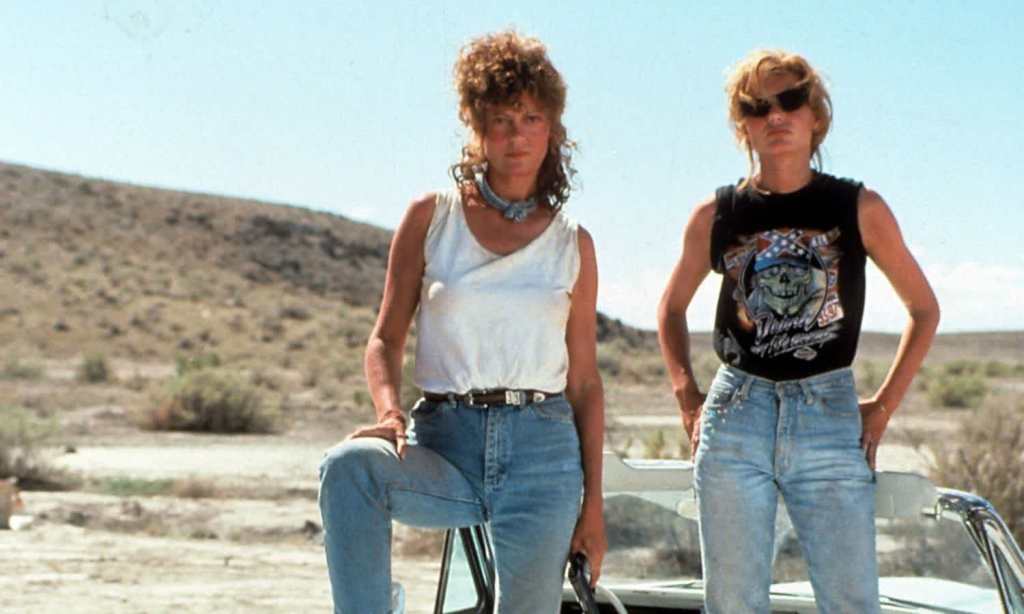30 years have passed since Thelma and Louise embarked on their epically tumultuous road trip in Ridley Scott’s eponymous film.
Starring Geena Davis and Susan Sarandon in the leading roles, Thelma and Louise traversed the vast expanse that is America, with the two women trying to evade the law, and their dissatisfying lives, as they headed for Mexico to start over.
In celebration of the film’s 30th anniversary, Sarandon and Davis convened at Los Angeles’ Greek Theatre for a special screening, preceded by a Q&A hosted by Rebecca Keegan of The Hollywood Reporter.
Davis recalled to the audience that when they made the film in 1991, people predicted that it would be the first of many films that feature women in lead roles.
“There are going to be so many movies starring women, about women, female road pictures, whatever,” she remembered of the buzz. “I’m thinking, hot dog, let’s sit back and wait for all this magic change to happen.
“We’re still waiting. It really did not happen. It seems like every five years or so, there’s another movie starring women that’s a huge hit and people say, ‘Well now certainly everything is going to change,’ and it really hasn’t.”
Thelma and Louise may not have signalled a much needed (lasting) shift in female representation on screen, but the film itself was a critical and commercial success — earning six Oscar nominations and winning for Best Original Screenplay.
Accolades like that make Davis’s assertion that nothing much has changed all the more puzzling, given that studios have finite proof of how bankable female-led films can be. While one could argue that the cinematic landscape for women outside of rom-coms has improved since 1991 — especially in the wake of the rapturous praise for 2020s Promising Young Woman, which also won an Oscar for Best Original Screenplay — it also cannot be truthfully said that films like Thelma and Louise have flooded the market.
Davis also revealed that the way in which women had received the film had had a real impact on her and had even influenced the roles she took on moving forward in her acting career.
“It made me realise how few opportunities we give women to come out of a movie feeling empowered by the female characters,” she said. “Men get that every movie they watch.”
“It made me really think about what women in the audience are going to think about my character from now on and led me to want to play parts where I could feel good about the choices the character makes. I turned down parts based on that thinking for sure.”
In fact, so passionate was she about equality in Hollywood, she even established the Geena Davis Institute on Gender in Media in 2004 and told Vanity Fair back in 2016 that the film “it didn‘t do shit” to improve the imbalance.
Meanwhile, screenwriter Callie Khouri, who was also in attendance at the event, told the audience that she had been “completely shocked” by some of the responses to the movie which sees Louise (Sarandon) kill a man in the parking lot of a bar after he attempts to rape Thelma (Davis) — thus causing them to make their chaotic dash toward Mexico.
“With all the murder and mayhem that you see in movies that male critics would be going, ‘They killed the guy.’ But it was just one guy and he had it coming,” Khouri argued. “Let’s not lose our heads here, it wasn’t exactly a murder spree.”
The screenwriter also recalled one particular critic, who went so far as to call the movie “neo-fascist”.
“I was like, wow, you really got to have your tighties in a wad to call this movie neo-fascist after all the bullshit that women have had to put up with in every movie that’s ever been made,” Khouri said.
Sarandon also weighed in on the controversy that swirled around the film upon its release, suggesting that the real issue seemed from the fact that, for once, women were taking up space in a genre traditionally reserved for men.
“I completely underestimated that we were backing into territory held by white heterosexual males,” the actress said. “They got offended and accused us of glorifying murder and suicide and all kinds of things.
“It didn’t seem like a big deal, it seemed like it was unusual that there would be a woman that you could be friends with, in a film. Normally, if there were two women in a film, you automatically hated each other for some reason. … Next thing we knew, all hell broke loose.”
Read more stories from The Latch and subscribe to our email newsletter.







